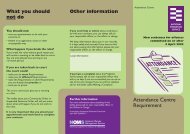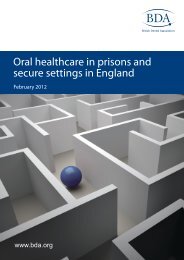Resettlement provision for children and young ... - Ministry of Justice
Resettlement provision for children and young ... - Ministry of Justice
Resettlement provision for children and young ... - Ministry of Justice
You also want an ePaper? Increase the reach of your titles
YUMPU automatically turns print PDFs into web optimized ePapers that Google loves.
4.37 The social worker <strong>of</strong> looked after <strong>children</strong> should be invited to all training planning meetings<br />
<strong>and</strong> encouraged to attend. Where a child will be returning to local authority care, the social<br />
worker will lead on arranging resettlement plans <strong>and</strong> there<strong>for</strong>e needs to be involved throughout<br />
a <strong>young</strong> person’s time in custody. However, we found that responsible home local authorities<br />
were only occasionally represented at initial training planning meetings <strong>and</strong> attendance at later<br />
meetings was inconsistent, with social workers rarely attending every time. This was<br />
detrimental to the planning <strong>for</strong> the care <strong>and</strong> resettlement <strong>of</strong> looked after <strong>children</strong>. Case<br />
supervisors reported that they invited social workers to all meetings but that <strong>of</strong>ten they did not<br />
attend. Some <strong>of</strong> the looked after <strong>children</strong> in our sample said that they had not seen their social<br />
worker at all while in custody.<br />
4.38 Outside <strong>of</strong> training planning meetings, <strong>young</strong> people can receive visits, letters <strong>and</strong> should have<br />
daily access to telephones to make calls, although having enough phone credit to do so can be<br />
a problem. In our survey, two-thirds (68%) <strong>of</strong> <strong>young</strong> men said they could use the telephone<br />
every day. Only two-fifths (38%) said they usually had at least one visit from family or friends a<br />
week. Less than half (46%) <strong>of</strong> <strong>young</strong> men said it was easy <strong>for</strong> people to visit them.<br />
Education/training staff<br />
4.39 Learning <strong>and</strong> skills activities undertaken by <strong>young</strong> people in custody should be allocated<br />
according to their individual needs <strong>and</strong> linked to ETE plans <strong>for</strong> their release. However at most<br />
establishments, case supervisors reported little contact with education staff, <strong>and</strong> they were<br />
only consistently attending training planning meetings at one establishment.<br />
Example <strong>of</strong> good practice<br />
HMYOI Parc<br />
There was a learning coach role within the education team who provided help to ensure that <strong>young</strong><br />
people with poor literacy received targeted support. They also attended initial training planning meetings<br />
<strong>and</strong> ensured that in<strong>for</strong>mation regarding a <strong>young</strong> person’s learning was shared between the education<br />
department <strong>and</strong> case supervisors.<br />
4.40 Where education staff did not attend training planning meetings, written contributions were<br />
sometimes submitted, but case supervisors reported that this was rare. This meant that a<br />
<strong>young</strong> person’s individual learning plan (ILP), set by education, <strong>of</strong>ten did not feed into the<br />
training planning process <strong>and</strong> case supervisors did not always know what activities the <strong>young</strong><br />
person was doing, how they were progressing <strong>and</strong> what, if any, certificates or qualifications<br />
they had achieved. Many case supervisors said they relied either on P-Nomis 38 records, if they<br />
were up to date, or the <strong>young</strong> person. One case supervisor said:<br />
‘Education had cuts in staff so only attend about 15% <strong>of</strong> meetings. We rely on entries<br />
on P-Nomis to see what <strong>young</strong> people have done in education, any qualifications etc,<br />
<strong>and</strong> it is a bit hit <strong>and</strong> miss as to how up to date they are. Often when it’s discussed<br />
with the <strong>young</strong> person they list others they have done.’<br />
4.41 There was some discrepancy between what case supervisors <strong>and</strong> case files suggested <strong>and</strong><br />
what was reported by the heads <strong>of</strong> learning <strong>and</strong> skills. Several heads acknowledged that<br />
38

















